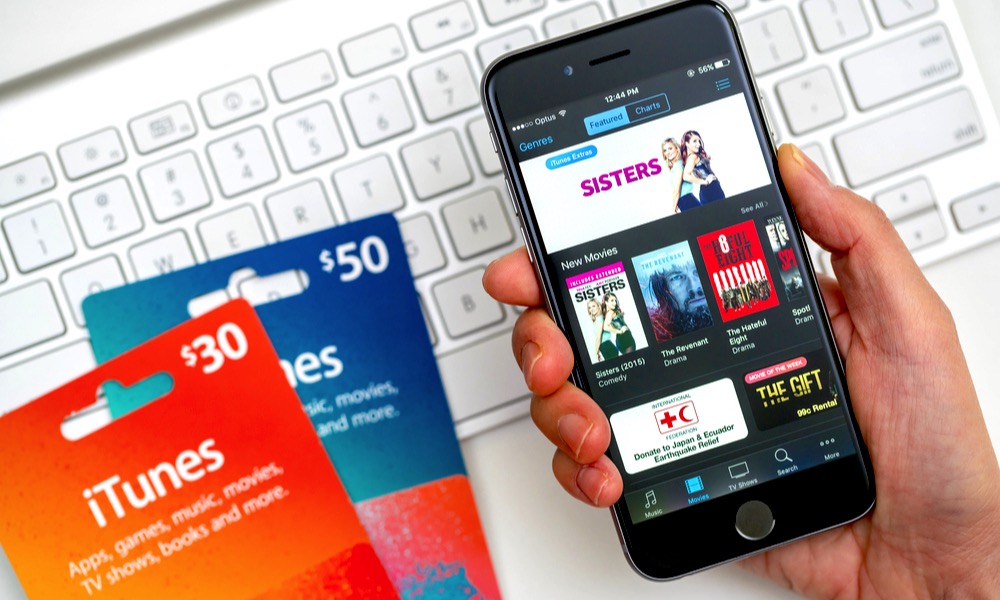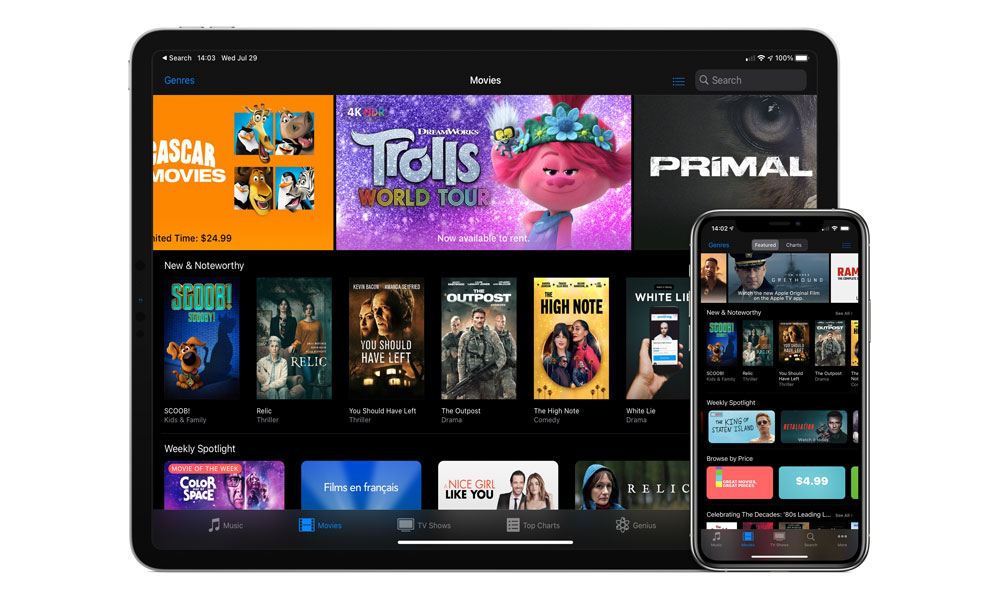You’ll Soon Be Able to Rent Blockbuster Movies on iTunes Just Days After They Play in Theatres
 Credit: ymgerman / Shutterstock
Credit: ymgerman / Shutterstock
Toggle Dark Mode
While we don’t want to minimize the huge cost that the ongoing global coronavirus pandemic has placed on our society as a whole, one small silver lining is that many Hollywood studios have begun to come around to the idea of more timely digital distribution of their major theatrical releases.
Apple and Hollywood have been in a dance for years, with the Cupertino company pushing the studio execs to get rights to release new movies as iTunes rentals, even while they’re still playing in their initial theatrical release, and while many of the studios have reportedly always been at least somewhat amenable to the idea, they’ve never quite been able to come to an agreement on how much they should cost and exactly when it would be most appropriate to release them.
The consensus in the negotiations has generally been that the sooner films become available, the more the rentals should cost, with some studios looking for rental prices of up to $50 for an iTunes rental that would be available 17 days after its theatrical debut, while others suggested a lower price of $30 for an iTunes rental 30–45 days later.
By comparison, most movies now become available for rental 90 days after their release, generally for iTunes’ standard $4.99 price, which is considerably less than a movie ticket. Studios are said to be open to the idea of earlier rentals, however, not just because they can make more money on them, but they also wouldn’t have to spend money on a second marketing campaign to re-introduce the movie into the rental market after it’s otherwise faded from the public consciousness.
Of course, Apple’s strategy is to get studios on board with iTunes specifically for this purpose, so that it would be able to distinguish itself from the competing video-on-demand services out there, like Google and Vudu.
The Winds of Change
It’s been a couple of years since we’ve really heard anything about Apple’s dealings with Hollywood in this area, and we’d generally believed that the idea had mostly died on the negotiating table. Studios presumably decided that there was more money to be made from getting people into theatres than letting them pay $50 a pop to watch movies at home, especially considering the lucrative first-run deals they have with many of the major theatre chains.
However, as the novel coronavirus pandemic shut down movie theatres around the world, Hollywood studios quickly found themselves in a difficult position when it came to their scheduled releases — either postpone them until theatres reopen and risk them getting lost in a sea of other studios doing the same thing, or find another way to get moviegoers to pay to see them.
In some ways it was actually a perfect storm for digital distribution, since Hollywood had all of these films ready for release, and viewers were stuck at home and hungry for new ways to entertain themselves. As more chains continued to close their theatres, Universal finally decided that if anybody was going to see their films in a timely manner, it was going to have to be by renting them on iTunes.
In fact, the situation pushed Universal and other Hollywood studios into a move that they had probably never even considered in their wildest negotiations with Apple: Same-day rentals of theatrical blockbusters for a mere $20 — a huge cry from the $50/17-day release schedule that they’d previously been holding out for.
The X Factor
Of course, difficult times call for drastic measures, and as much as we all might have hoped that the studios would continue this trend, it’s safe to say that this has been an exception due to the theatres being shut down completely.
It’s worth noting here that the studios aren’t the only players in the game — big theatre chains like AMC also hold the reins in the form of contracts that mandate a 90-day window of exclusivity for movies to run in their theatres before being distributed in any other way. Any alteration to these terms by the studios risks alienating the theatre chains, which could result in movies getting a much more limited big-screen showing — or possibly even no showing at all.
In fact, this was at the core of a big dispute between the two entertainment companies that arose after Universal began offering same-day rentals back in March. Following the massive $95 million success of Trolls World Tour as rentals on iTunes and other PVOD platforms, Universal CEO Jeff Shell stated that even after theatres reopened, Universal expected that it would “release movies on both formats,” suggesting a simultaneous theatrical release.
As a result, AMC CEO Adam Aron fired off a pointed statement that while he understood Universal’s decision to make an exception while theatres were closed, the suggestion that the studio might continue to do so into the future meant that AMC would be boycotting Universal’s movies entirely, stating that “Going forward, AMC will not license any Universal movies in any of our 1,000 theatres globally.”
Aron’s response actually demonstrates just exactly where the difficulty has been in getting the Hollywood studios on board with Apple’s original push for early iTunes rentals, since of course the large theatrical chains — which are in direct competition with PVOD services like iTunes — need to agree to these deals as well. It’s safe to say that companies like AMC aren’t about to give up their highly valuable 90-day exclusivity on new releases, and Hollywood studios have to walk a fine line to avoid alienating them in the way that Universal did.
Of course, at the end of the day it’s all about money, and AMC and other theatre operators have expressed a willingness in the past to consider alternatives to the current structure — as long as it still improves their bottom line.
So it now appears that both Universal and AMC have reached a deal that will reduce the exclusivity window for theatrical releases down to only 17 days — a period that includes three full weekend runs — before the studio will have the option to make its movies available on other “premium video on demand” (PVOD) platforms.
It’s unclear exactly what the terms of the deal are between Universal and AMC in this case — it seems that AMC is getting a share of “these new revenue streams that will come to the movie ecosystem from premium video on demand,” but neither company has disclosed exactly how that will work.
What This Means
While this is not actually a full shortening of the 90-day window — the announcement makes it clear that the 17 days only applies to premium video-on-demand services — it does mean that you’ll now be able to rent Universal’s movies on iTunes and other premium rental services much sooner than you could before — as long as you’re willing to pay the premium, of course.
However, the timeline for other distribution methods, including digital sales and traditional rentals remain unchanged, so in practical terms, this means that you’re still not going to see a $5 iTunes rental or find it on a streaming service until a movie has finished its 90-day theatrical run, but Universal will now be able to offer it for on-demand rental at a premium price — likely in the $20+ range — 17 days after it first launches in theatres.
Lastly, it’s also worth noting that the current deal only affects films from Universal. Other Hollywood studios will need to make their own deals with AMC and other theatrical chains independently. It’s not clear right now if any of them are pursuing this — while others like Disney and Warner Bros. have also done same-day theatrical releases during the pandemic, unlike Universal they haven’t expressed any desire to continue that practice once theatres begin reopening to larger audiences. Hopefully, however, with Universal leading the way, others may be encouraged to follow suit and negotiate similar deals with the cinemas.







